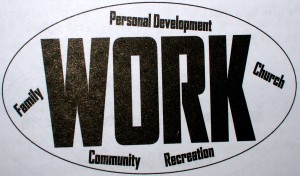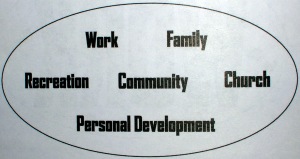Welcome back for Section 2 of 48 Days to the Work You Love!
The three main points from this section are:
1. The focus of this program is to learn how to plan your work around the life you want.
2. You must strive for balance in your life. Extreme success in one area often is at the detriment to another area of your life. You want to build toward success in seven areas of your life (I'll tell you what they all are in a bit).
3. Goals are essential - written correctly they are not restrictions, rather they are road maps and guides so we can achieve freedom and accomplishment.
Dan begins this section by discussing the difference between vocation, career, and job. A vocation incorporates calling, purpose, mission, and destiny. I am used to hearing this word in relation to ministry, but Dan takes it out of that context. Everyone has a vocation - it is up to you to learn a bit more about yourself, listen, and figure out what that is.
A career is a line of work, and it may (or may not) contribute to fulfilling your calling. Many different careers can support the same vocation. For example, the vocation to "help reduce pain and suffering in the world" may be fulfilled by many different careers: doctor, nurse, counselor, pastor, teacher, scientist, politician, writer, and the list can go on from here. Which career you choose should depend on your unique skills and abilities, personal tendencies, and values, dreams and passions.
Finally, a job consists of the daily activities you perform in order to produce income. This may be part of your vocation, or it may be simply something to pull in a paycheck. Obviously, the goal here is to get your job to be yourcareer which furthers your vocation in life.
Most people are used to looking at life within this framework

where work is the center of our lives, and the rest fits in around it, when and where there is space. (Replace "church" with "spiritual growth," or whatever word/phrase best suits your beliefs.) Dan challenges us to a paradigm shift, where we look at life like this:

Now work has an equal emphasis as the other aspects of our lives. This is balance, when all aspects of your life get (approximately) equal attention, and none is significantly overpowering the others.
Granted, not every day is going to have equal effort into each of these areas. Got a big deadline coming up? Chances are "work" is going to get a lot bigger for a couple of weeks, while perhaps "recreation" and "family" shrink a bit. The trick is, this should only be temporary. Once that deadline is past, make an effort to invest some time and energy into those areas that slipped a little during the mad dash to the finish. You won't be balanced every day, probably not every week, maybe not even every month. What you're really going for is an overall sense of balance in your life.
Finally, goal setting. Dan tells us that only about 8% of the population has clear goals. Only about 3% of the population actually write their goals down. Supposedly, the 3% of the population with written goals accomplish more than all of the other 97%, although I'm not sure how you can assess this. We are setting goals in seven main areas of life: Financial, Physical, Personal Development, Family, Spiritual, Social, Career. It is no accident that Career is listed last. Remember what we are learning how to do? Find the LIFE you want, and plan your work around that.
Dan encourages you to start with five-year goals, work back from there to one-year goals, and finally to something you can do today to kick-start your progress. Where do you want to be in five years? What salary do you want to make? What car do you want to drive? Where do you want to live? What kind of house do you want? How big is your family? What is your involvement in church and other community organizations? How often do you exercise, and what do you do? What books have you read? Who are you mentoring?
To borrow from another of my favorite authors, Dave Ramsey also has some ideas on goal setting. Goals need to be specific ("I want to lose 20 pounds," not "I want to lose some weight"), measurable, yours ("I want to be a lawyer," not "my parents want me to go to law school"), time-sensitive (give yourself a deadline), and written.
Keeping these guidelines in mind, set yourself some goals in the seven main areas of life! Remember, these are not set in stone. They can, and should, change and evolve as you do. You should revisit your goals at least once a year (preferably more often) to check in, see how you are doing, and re-evaluate what your goals are and where you are heading.
Feel overwhelmed? Think of it this way, "A goal is a dream with a timeframe on it."
Happy goal setting! Come back next week for Section 3: Planning my work around the life I want!
The three main points from this section are:
1. The focus of this program is to learn how to plan your work around the life you want.
2. You must strive for balance in your life. Extreme success in one area often is at the detriment to another area of your life. You want to build toward success in seven areas of your life (I'll tell you what they all are in a bit).
3. Goals are essential - written correctly they are not restrictions, rather they are road maps and guides so we can achieve freedom and accomplishment.
Dan begins this section by discussing the difference between vocation, career, and job. A vocation incorporates calling, purpose, mission, and destiny. I am used to hearing this word in relation to ministry, but Dan takes it out of that context. Everyone has a vocation - it is up to you to learn a bit more about yourself, listen, and figure out what that is.
A career is a line of work, and it may (or may not) contribute to fulfilling your calling. Many different careers can support the same vocation. For example, the vocation to "help reduce pain and suffering in the world" may be fulfilled by many different careers: doctor, nurse, counselor, pastor, teacher, scientist, politician, writer, and the list can go on from here. Which career you choose should depend on your unique skills and abilities, personal tendencies, and values, dreams and passions.
Finally, a job consists of the daily activities you perform in order to produce income. This may be part of your vocation, or it may be simply something to pull in a paycheck. Obviously, the goal here is to get your job to be yourcareer which furthers your vocation in life.
Most people are used to looking at life within this framework

where work is the center of our lives, and the rest fits in around it, when and where there is space. (Replace "church" with "spiritual growth," or whatever word/phrase best suits your beliefs.) Dan challenges us to a paradigm shift, where we look at life like this:

Now work has an equal emphasis as the other aspects of our lives. This is balance, when all aspects of your life get (approximately) equal attention, and none is significantly overpowering the others.
Granted, not every day is going to have equal effort into each of these areas. Got a big deadline coming up? Chances are "work" is going to get a lot bigger for a couple of weeks, while perhaps "recreation" and "family" shrink a bit. The trick is, this should only be temporary. Once that deadline is past, make an effort to invest some time and energy into those areas that slipped a little during the mad dash to the finish. You won't be balanced every day, probably not every week, maybe not even every month. What you're really going for is an overall sense of balance in your life.
Finally, goal setting. Dan tells us that only about 8% of the population has clear goals. Only about 3% of the population actually write their goals down. Supposedly, the 3% of the population with written goals accomplish more than all of the other 97%, although I'm not sure how you can assess this. We are setting goals in seven main areas of life: Financial, Physical, Personal Development, Family, Spiritual, Social, Career. It is no accident that Career is listed last. Remember what we are learning how to do? Find the LIFE you want, and plan your work around that.
Dan encourages you to start with five-year goals, work back from there to one-year goals, and finally to something you can do today to kick-start your progress. Where do you want to be in five years? What salary do you want to make? What car do you want to drive? Where do you want to live? What kind of house do you want? How big is your family? What is your involvement in church and other community organizations? How often do you exercise, and what do you do? What books have you read? Who are you mentoring?
To borrow from another of my favorite authors, Dave Ramsey also has some ideas on goal setting. Goals need to be specific ("I want to lose 20 pounds," not "I want to lose some weight"), measurable, yours ("I want to be a lawyer," not "my parents want me to go to law school"), time-sensitive (give yourself a deadline), and written.
Keeping these guidelines in mind, set yourself some goals in the seven main areas of life! Remember, these are not set in stone. They can, and should, change and evolve as you do. You should revisit your goals at least once a year (preferably more often) to check in, see how you are doing, and re-evaluate what your goals are and where you are heading.
Feel overwhelmed? Think of it this way, "A goal is a dream with a timeframe on it."
Happy goal setting! Come back next week for Section 3: Planning my work around the life I want!



No comments:
Post a Comment